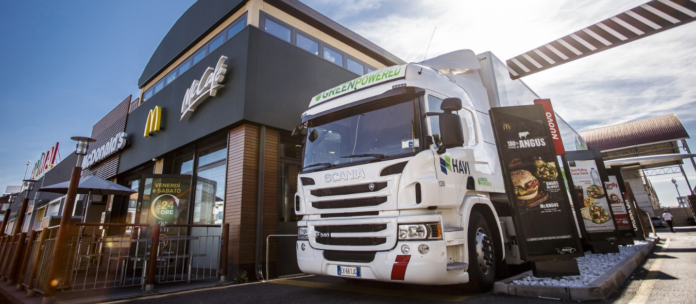Truck manufacturer Scania and HAVI, a global supply chain specialist, are teaming up to significantly reduce emissions for the McDonald’s supply chain, shifting nearly three-quarters of HAVI’s total truck fleet to alternative fuels.
Starting in the third quarter, HAVI and Scania will implement a five-year roadmap aimed at making a significant carbon footprint reduction in transport operations to and from McDonald’s restaurants in several European countries utilizing Scania’s next-generation trucks and operating solutions.
Specifically, the aim is to significantly reduce the number of diesel-powered vehicles and convert approximately 70% of HAVI’s total truck fleet to alternative fuels, including hybrid models, by 2021 within several European countries.
As reported, the CO2 emissions in deliveries by HAVI to McDonald’s restaurants utilizing Scania’s next generation trucks and operating solutions will be continuously monitored in real time, bringing existing fleet connectivity to the next level. This fleet transformation is expected to lead to CO2 reductions ranging from 15% to 40% for every kilometer driven, depending on route, fuel and traffic conditions.
“Innovation is absolutely critical to our sustainability journey and to use our scale for good. Our work with companies like HAVI and Scania takes a proactive approach to finding and implementing more sustainable supply chain solutions and contributes to our global supply chain and sustainability strategy,” says Chris Yong, global logistics director at McDonald’s.
“Leaders in business have a responsibility to drive change. In this partnership, we are setting a new standard for urban deliveries. We are not only discussing plans, but actually implementing measures here and now, to benefit the communities where we operate,” says Haluk Ilkdemirci, president of logistics for HAVI.
“Undeniably, we see demand for sustainable transport solutions growing. This is an example of the kind of smart partnerships through which we can be more innovative and, together, accelerate the shift towards a sustainable transport system,” says Henrik Henriksson, president and CEO at Scania
According to Scania, the hybrid trucks are designed to generate close to zero air pollution and significantly reduce carbon emissions in cities. The trucks are significantly quietier and along with the low-noise cooling equipment will help lower the impact of the deliveries made in city centers and elsewhere.
The collaboration will initially focus on Europe, while similar approaches are also being explored for Asia.




